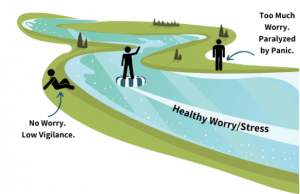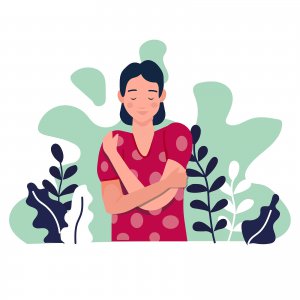Understanding Food Allergies
Having food allergies can bring about experiences of anxiety and stress. If you are living with food allergies, you know all too well the unique challenges this brings. We know that there is a link between anxiety and food allergies and that with increased anxiety comes higher stress levels. This isn’t all bad news! Stress and anxiety are helpful tools in managing food allergies. They aid in your mission to keep yourself or your child’s safety and well-being at the front of your mind when moving through life. However, high levels of anxiety and stress can be as complicated as having very little of both. To find the balance, consider these 5 tips for anxiety and stress management with food allergies.
Realize that Stress Has Levels
Stress is a state of worry or muscle tension caused by a difficult situation. It is a natural human response that prompts us to address challenges and threats in our lives. While too much anxiety and stress can be incredibly overwhelming, stress does serve a function for us. We need to be aware of and befriend our stress and anxiety. But how much stress is too much? Is there such a thing as too little?
To answer these questions, take a look at this river. As you go through life, there is a healthy level of worry/stress when it comes to food allergies that should keep you afloat on the river. This lets you enjoy the path while also staying appropriately vigilant. The left bank of the river shows no worries and therefore low vigilance with your food allergies.
With no worry, you may be more susceptible to exposure to allergens. On the opposite bank though is a level of too much worry. A place where you can become paralyzed by panic. Keep the river in mind and be aware of when you start to notice yourself or your body shifting to either of the outer banks.
Understand that Safety is Not a Binary of Safe vs Not Safe
The primary goal is to maintain safety and well-being for yourself or your child with food allergies. What does it mean to be safe?
In most food allergy scenarios, whether eating in a new restaurant or going to a person’s home for a meal, the level of safety may vary. For example, going to a playdate comes with many factors. If you have spoken with that child’s parent about your child’s needs in the past, there is probably a higher degree of safety in this scenario. Comparatively, going to a Chinese restaurant that puts peanuts in 50% of the dishes they cook, would probably fall somewhere on the unsafe area of the gradient if you have a peanut allergy.
Most scenarios will lie somewhere in the grey. You will know best what that grey encompasses for you and your specific food allergy. In many situations, you can also use your food allergy management skills to move closer to the safe area of the gradient.
Embrace the Role of Avoidance In Food Allergies
Typically with anxiety, avoidance isn’t the choice coping mechanism. However, when it comes to food allergies, this advice changes. Avoidance is a useful strategy for food allergies because there are certain situations that are likely to trigger a reaction. Avoiding restaurants that can’t guarantee that your allergen is kept separate from other items in the kitchen is important. However, this doesn’t mean you need to avoid living your life just because you have food allergies. You can find allergen-free or allergen-friendly restaurants.
There is a difference between what healthy and unhealthy avoidance looks like. Healthy avoidance is when you avoid a restaurant that puts you at a higher risk by eating there. Unhealthy avoidance would be not going to any restaurants regardless of where they fall on the safety scale just to manage your stress. (This is not to say that avoiding restaurants is not an appropriate food allergy management tool for some). Indeed, unhealthy avoidance can keep you from interacting with the world.
Use Food Allergy Management Skills
Use food allergy management strategies to handle your particular food allergies.
- Always carry your epinephrine, know your food allergy plan, and practice implementation
- Avoid known allergens-containing products or environments.
- Educate yourself about food allergies, your allergen, and appropriate management strategies.
- Read the labels of products, and know where your particular allergen might be hidden. Learn about cross-contamination and ways to reduce it.
- Lean into your support systems. This includes your allergist, your close family members, a trusted friend, and/or online communities.
- Your Mindset Matters! The way you frame the situation can have a huge impact.
- Advocate for yourself or your child. Self-acceptance and boundaries are important. I have the right to take up space and have my needs met.
Actively Manage Stress
We know that appropriate stress levels can lend itself to food allergy management. We also know that food allergy experiences can influence stress. Sometimes we attempt to avoid situations related to food or food allergy management to handle stress. Even though avoidance can help manage food allergies it is not a great long-term stress management technique. This means we have to have other ways to manage our stress.
Focusing on stress management helps us to properly manage food allergies. Instead of avoiding situations to reduce stress, we can plan the best course of action and enjoy life to the fullest. General stress management can keep our baseline stress level lower. This will give you the energy to thrive.
Use Body-Based Strategies
Breathing
Slow your breathing. Count to 5 while you breathe in, and 5 while you breathe out to slow down your breath.
Meditation/Mindfulness
Use your five senses. Attend to each of the senses (touch, taste, sound, smell, and sight) to create comfort for your body.
Use Mind-based Strategies
Self Talk – “What if” vs “Even If”
This perspective shift is powerful. For all the racing what-if questions, make yourself a plan. “Even if this happens, I can do X, Y, Z.”
Problem-solving STEPs include:
-
-
- Say the Problem
- Think of the Solutions
- Explore the consequences of each solution
- Pick a solution
-
Anxiety and stress management go hand in hand with management of your food allergies. Understanding that safety is not binary and that stress has levels lets you know what’s comfortable and right for you. Avoidance is a useful food allergy coping mechanism but not a useful stress management technique. You have many food allergy management skills in your toolkit that you can lean on. Finally, being active in stress management can be done with both mind and body-based strategies. Know that these feelings are normal, they are functional, and you can work with them to thrive!
Learn to Manage Allergies and Anxiety in Branchburg, NJ Today!
If you are interested in learning more about food allergy and anxiety treatment, our trained and caring therapists at our offices in Branchburg and Scotch Plains are waiting to work with you. If you’d prefer to meet with a counselor via video session, we offer online therapy in New Jersey. To begin counseling, follow a few simple steps:
1. Connect with Brave Minds Psychological Services today for a free, 20-minute consultation call.
2. Get your questions answered by one of our understanding therapists.
3. Begin feeling more hopeful about your food allergies today.
Other Counseling Services at Brave Minds Psychological Services
At Brave Minds Psychological Services, we offer a variety of services from our licensed therapists in order to get you on the right path to healing. Our therapeutic services include therapy for children, anxiety treatment for children, child sexual abuse therapy, therapy for teens, anxiety treatment for teens, and teen social phobia therapy. We also specialize in adult anxiety counseling, couples counseling, counseling for parents, postpartum counseling, birth trauma therapy, sexual assault counseling for adults, and group therapy.
We also have a blog where we write about a variety of different mental health subjects. If you’re interested in learning more about our mental health services here at Brave Minds Psychological Services, please contact our Scotch Plains and Branchburg counseling offices!






